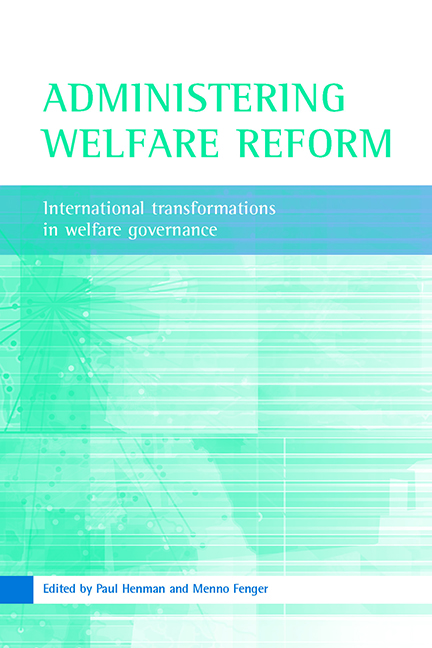Book contents
- Frontmatter
- Contents
- List of tables
- Preface
- Acknowledgements
- List of abbreviations
- Notes on contributors
- one Introduction: administering welfare reform
- two Welfare reform as governance reform: the prospects of a governmentality perspective
- Part One Participants: reforming the agents of welfare delivery
- Part Two Practices: the welfare governance of street-level practices
- Part Three Processes: the changing spaces of welfare governance
- Index
- Also available from The Policy Press
two - Welfare reform as governance reform: the prospects of a governmentality perspective
Published online by Cambridge University Press: 14 January 2022
- Frontmatter
- Contents
- List of tables
- Preface
- Acknowledgements
- List of abbreviations
- Notes on contributors
- one Introduction: administering welfare reform
- two Welfare reform as governance reform: the prospects of a governmentality perspective
- Part One Participants: reforming the agents of welfare delivery
- Part Two Practices: the welfare governance of street-level practices
- Part Three Processes: the changing spaces of welfare governance
- Index
- Also available from The Policy Press
Summary
How might we think about the nature of welfare reform and its administration? This chapter, and this book more generally, argue that an understanding of welfare reform cannot be achieved without reference to its administration. Welfare administration is the very locus in which the operation and effect of policy is defined and governmental power relations flowing through welfare agencies, staff and claimants constituted. This chapter begins with this perspective, by arguing that welfare reform is governance reform. Such a perspective requires a coherent analytical framework to advance our critical understanding of this topic. To this end, this chapter advocates the Foucauldian governmentality analytic, which is summarised in section three. How the governmentality analytic can be applied to the domain of welfare reform is then discussed and demonstrated.
Welfare reform as governance reform
On the surface, an examination of the administration of welfare reform focuses on the implementation and the ongoing administration of a predefined policy. Such a view reflects the conventional account of public policy-making processes. Policy is made and defined by government – be it the executive or Parliament – and introduced and made real by public servants in government departments (or their outsourced delegates). While the classical account of policy as a decision-making process has now been broadened into studies of policy cycles (Bridgman and Davis, 2004, ch 3), policy networks (Marsh and Smith, 2000) and policy advocacy coalitions (Sabatier and Jenkins-Smith, 1993), the central imaginary of most policy studies is a formal policy determined by government. This delineation between policy making and policy implementation is also reinforced by the disciplinary foci of ‘public policy’ and ‘social policy’, on the one hand, and ‘public administration’ and ‘social administration’, on the other. Saying both precedes and commands doing.
This conceptualisation of the distinction between a formal policy decision and its implementation is reflected in the policy studies literature, when it defines ‘policy’ in terms of government decisions. For example, Bridgman and Davis discuss policy as ‘authoritative choice’, as ‘hypothesis’ and as ‘objective’ (2004, pp 4-6). However, the policy studies literature also has a more encompassing understanding of policy. For example, Levin (1997, pp 15-18) examines policy as: a stated intention; a current or past practice; an organisational practice; and an indicator of the formal or claimed status of a past, present or proposed course of action.
- Type
- Chapter
- Information
- Administering Welfare ReformInternational Transformations in Welfare Governance, pp. 19 - 42Publisher: Bristol University PressPrint publication year: 2006



